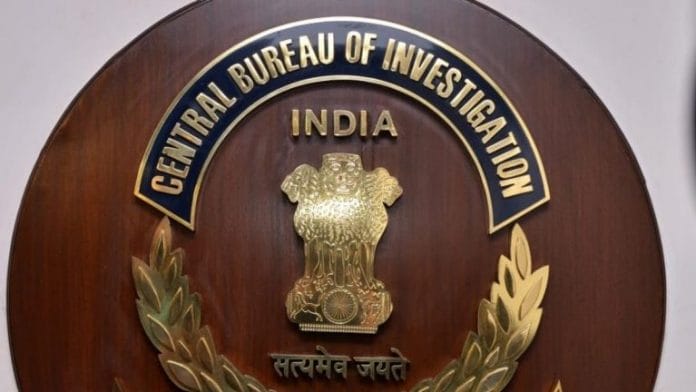New Delhi: The CBI has said there are around 100 “high-value fraud cases that could not be registered due to non-accordance of specific consent by some states”.
The matter of general consent was discussed by a CBI source as they weighed in on the status of the investigation into the alleged Rs 22,842 crore bank fraud by Gujarat-based ABG Shipyard.
This bank fraud, however, has nothing to do with general consent, as it was registered in New Delhi and the investigation will extend to Gujarat, which has not withdrawn the general consent needed for the CBI to probe any case.
According to the source, the CBI has with it over 100 complaints of fraud — including those of bank fraud and corruption — from across states. But cases have not been registered because the states have not yet given their consent to start a probe, the source added.
“It has become difficult to register cases in states that have withdrawn general consent under Section 6 of the Delhi Special Police Establishment (DSPE) Act,” the CBI source said.
The powers of the CBI are defined under the DSPE Act. The Act states that its jurisdiction extends to all states under Section 5 of the Act. However, according to Section 6, the CBI can probe or conduct raids only with the consent of the state government.
The eight states that haven’t given consent for the CBI to probe cases on their turf are Maharashtra, Punjab, Rajasthan, West Bengal, Jharkhand, Chhattisgarh, Kerala, and Mizoram. All except one – Mizoram, where the leading party is an NDA ally – are led by the Opposition.
“We have received over 100 complaints of suspected high-value fraud from different parts of the country. However, we cannot investigate as we do not have consent from the state government concerned. We keep reminding them but there is no response from their side,” said the CBI source.
Last year, a parliamentary committee asked the government to assess the need for amending existing laws or bring out a new legislation to clearly define the mandate of the CBI and vest more power in it.
The recommendation came after the CBI informed the panel that its investigations were impeded by the withdrawal of general consent by some states.
The CBI moved the Supreme Court in this matter last year. In November 2021, a top court bench of Justice Sanjay Kishan Kaul and Justice M.M. Sundresh referred the case to Chief Justice N.V. Ramana for consideration.
Also read: 5 years, 28 banks, Rs 23,000 cr debt — how ABG Shipyard pulled off ‘India’s biggest bank fraud’
‘Loans were disbursed between 2005 and 2012’
The probe into the alleged bank fraud by ABG Shipyard, according to the CBI, has revealed that the majority of disbursement was made between 2005 and 2012 by a consortium of 28 banks led by ICICI Bank and SBI.
According to a complaint by SBI, the account of ABG Shipyard turned into a Non-Performing Asset (NPA) to the tune of Rs 22,842 crore on 30 November 2013.
The account was restructured under Corporate Debt Restructuring (CDR) schemes on 27 March 2014. However, the company’s operations could not be revived, CBI officials said.
Meanwhile, lookout circulars (LOCs) against the directors and promoters of the company were opened by the CBI this week, to stop them from leaving the country.
SBI had also opened an LOC against the main accused — Sushil Aggarwal — in 2019, but it lapsed in 2020.
How did the ABG Shipyard fraud unravel?
Explaining the timeline of the suspected fraud, CBI officers said N.V. Dand & Associates, who were deputed to audit the ABG Shipyard Ltd in 2014, found “various faults” when it submitted its report on 30 April 2016.
In exactly two months, the account of the shipyard was declared NPA with retrospective effect from 30 November 2013.
“In keeping with a policy implemented since 2014 of red-flagging suspect accounts, commissioning forensic audits by impaneled forensic auditors, and making chairman and managing directors liable, a forensic audit was initiated based on the lenders’ decision in the joint lenders meeting dated 10 April 2018 and Ernst & Young LLP was appointed forensic auditor,” the CBI officer added.
According to the officer, in line with the usual practice, these forensic audits covered a period starting approximately three to four years prior to the date of declaration of NPA, which, in this case, was 2016.
“The forensic audit of ABG Shipyard Ltd, therefore, covers the period from 2012 to 2017,” the officer said.
The officer said the company was also referred to the National Company Law Tribunal (NCLT), Ahmedabad, on 1 August 2017 by ICICI Bank for Corporate Insolvency Resolution Process (CIRP).
“In between April 2019 and March 2020, various banks of the consortium declared the account of M/s ABG Shipyard as fraud,” the officer said.
Also read: What is Modi govt’s ‘bad bank’ that will buy Rs 2 lakh crore debt, free up lending
Loans disbursed included letters of credit
According to the CBI, the 28 banks in the consortium made disbursements of different nature to the company.
“There were different kinds of bank loans including cash credit loan, term loan, letter of credit, bank guarantee, that were given as advance by the banks,” the CBI source said.
“With these loans, huge investments were made in an overseas subsidiary. Bank loans were diverted to purchase huge assets in the name of its related parties,” the source said.
The CBI has till now conducted searches at 13 locations, and is said to have recovered documents such as books of accounts, purchase and sales details, minutes of board meetings, share registers, and various contract files.
Bank account details of the accused, as well as related parties, have been obtained. The accused have been located in India, the officer said.
(Edited by Manoj Ramachandran)
Also read: What is the best asset monetisation plan? Modi govt can learn important lessons from Australia






